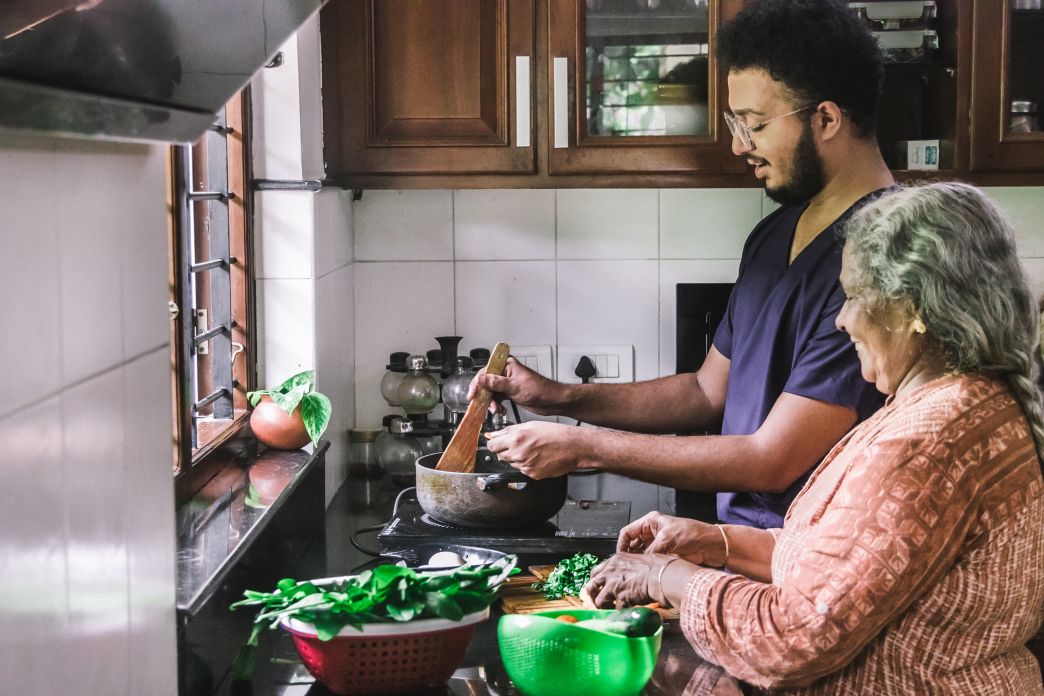Caring for a Loved One
Having a strong support network of family and friends is crucial when coping with a life limiting condition. What you do as a carer is vital to the physical, emotional, social, and spiritual wellbeing of the person you’re looking after.
It can be helpful to remember that every day can be different for someone with a life limiting condition. The questions and concerns you have today will likely change next week, and next month – sometimes even the next day. Some questions you and your loved one face will be unanswerable. You may have to deal with some questions immediately, while others reveal themselves gradually, depending on the person’s illness and your own situation.
What is my role as a caregiver?
Often people fall into the role of caregiver without considering the implications on their own wellbeing and this can lead to further challenges over time.
This journey can often be made easier by taking time to think about – and talk about – your relationship with the person nearing death: the choices and questions you both face; how they may react and change over time, what their total needs are and the additional support needed to meet these needs, how your relationship could change and how you can ensure good communication between you both, as well as others who will be supporting them.
This page includes valuable knowledge and information from the Hospice New Zealand Guide for Caregivers.


Early questions and choices
You’ll probably find yourself asking questions such as:
- How long will we have?
- Can I do this on my own or will I need help?
- What other support should I seek out and when?
- What pain and symptoms will there be and how can they be managed?
- Will I know how to best care for my loved one and keep them comfortable?
- What decisions can we make together to allow my loved one to live the last stage of their life as well as possible?
- Who will help us with with medical and other needs?
- How will I know what to ask for and when?
- Where might care be provided?
- Will they be able to stay at home at the end?
- How will I cope throughout all of this?
- How will our family live without them?
How to talk about what is happening
Fear of the unknown is one of the hardest things to handle and because many cultures around the world don’t talk openly about death, fear of dying is common. The person you’re caring for may be feeling a sense of loss, grief, shock, anger, panic, denial, hopelessness and/or emotional turmoil. You may also be facing the same feelings.
Most people find that by talking, they ease their sense of fear. Putting steps in place can take away the fear and give you and your loved one some peace of mind, and help you both begin to accept what is happening. Everyone’s experience will be different because everyone’s physical, emotional, social and spiritual needs are different.
How to help someone suffering with depression
Serious depression is part of end- stage illness for many, so caring for your loved one’s psychological needs may mean talking with your doctor or nurse. Depression can be triggered by disease or be a side-effect of commonly prescribed drugs.
Signs of depression are chronic sadness, lack of energy, difficulty sleeping, loss of appetite, frequent crying, withdrawal and suicidal thoughts. Discuss these with a health professional so the depression can be addressed and managed.
Making a plan together
When someone close to you finds out they have a life limiting condition, there will be many questions, but there will also be things you do know. By starting to make a plan, you can support your loved one through what is often an incredibly sad and challenging transition. Making a plan together gives you an opportunity to talk about what you both want and need. This is usually a very difficult conversation to begin, but the more you talk about it, the easier it will become, and the better prepared you will both feel. It is important to consider who else could help with your planning, including other family and friends, medical professionals and also your lawyer and accountant, to make sure your legal and financial affairs are in order.

Here are some suggestions on where to start your planning journey:
- Ensure your loved ones medical needs and pain levels are being managed.
- Create a wider support network for you and your loved one.
- Consider everyday needs like cleaning, cooking and transport.
- Help your loved one put their legal and financial affairs in order.
- Organise oral or family histories and put together scrapbooks and photo albums.
- Talk about any unresolved matters and help your loved one find closure.
- Enjoy the good moments and the good days. This is also a special time to make memories and to think and talk about your life together.
- Help fulfil any outstanding wishes your loved one may have.
- Think carefully about what you can do to help your loved one live every moment fully.
- Do your best to be a good listener.
- Be truthful when asked for your thoughts and feelings.
- Be ready for your loved one to feel very strongly, and possibly direct their anger at you.
The Go With Grace Plan is a free, user-friendly tool to record end-of-life wishes and plan your farewell so your loved ones know what you want when the time comes.
Open and honest communication
It can be so hard to know what to say when someone we care about is dying. Open and honest communication will help to ensure the your loved ones needs are properly understood, but it’s also important to be truthful when asked for your thoughts and feelings, because you are important too.
Some days your loved one will be happy to plan ahead and talk about dying, and other days they may just want to ignore their situation and act like nothing has changed – this is all okay and normal. When you are dying, it can be wonderful to have days when you don’t think about it. Often the best thing you can do it just be there to show them and tell them you care. People may feel depressed and try and isolate themselves, so it can be helpful to introduce a wider support network early on, so these visits and connections become regular, and can be maintained right to the end of your loved one’s life. Becoming dependent on others can cause distress, so try to give the person you’re caring for as much control as you can.
Take your cues from them and try to be a good listener. Consider the feelings behind statements (read in between the lines). They may also have big emotional responses to their situation, and negative feelings like anger, frustration and fear are often directed at loved ones – try to see this for what it is, and know it’s not personal. A dying person may need to tell you about something that’s important to them. They may want to resolve long-standing conflicts and satisfy final wishes. Help your loved one contact and communicate with family and friends as this may help relieve their sense of isolation.
